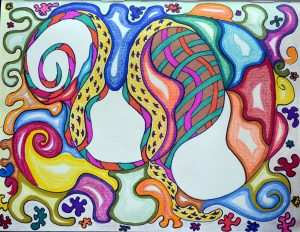SHAME CAUSED BY TRAUMA
Shame is a complicated emotion that is felt by someone who feels they have done wrong or aren’t good enough. This can come after doing something that others see as shameful and can even be felt when things are totally out of your control. When it is caused by trauma, it can bear a huge burden that will last a lifetime if not dealt with.
Being ashamed is feeling this low point of self-esteem and can leave you feeling worthless and like there is no hope for you. This is damaging to self-esteem, unless you can recover from it. Keep reading to learn more about how you can deal with shame caused by trauma.

When Trauma Causes Shame:
Shame is a low feeling of self-consciousness that has varied effects on your emotional well-being. It’s a feeling of guilt, not being enough, or feeling like you don’t belong somewhere.
These feelings cause low self-esteem, low self-respect, and constant feelings of insecurity. When shame is caused by trauma, it is a much deeper experience that really hinders the development of healthy self-esteem.
Throughout my young life, I experienced sexual abuse and, during adolescence, fear of becoming pregnant by my abuser. This was heightened after it happened to one of my schoolmates.
My final trauma came when I was 19, in the outback of Australia, away from civilization, and being raped daily for over three weeks. It took years to understand that perpetrators, who, in my opinion, had also been sexually abused.
Signs of Shame That Is Caused By Trauma
Most people, when they feel humiliated, can have physical systems like, red face, squeeze the stomach, run, hide, lash out. However, most sexual abuse victims become very good at shutting down their physical bodies and energetically disappearing as a coping mechanism.
My initial response was always from anger, and that still occurs today. When I traced it back, I found out that it is a lack of acceptance. It became a vicious cycle because I became frustrated with my family members not understanding me. I didn’t even understand myself. I felt something was wrong with me.
This lack of self-esteem spurred lots of negative behaviour. I became a workaholic who felt safer burying myself in work, instead of having to deal with people. I was an entrepreneur, happier working 24/7 for myself than working a 40-hour week for a boss.
· Extremely Low Self Esteem
· Addiction Issues
· Anger Issues
· Constant Self-Blame
· Avoidance
How Trauma-Caused Shame Affects Your Life
Looking back, I spent most of my life disconnected because of the refusal to accept my traumas. I got stuck in a frozen place of chaos, and rage. As a child, I would not go near a man. However, as I grew up, things changed.
Whenever life did not go my way, or I crossed a person who went strictly by the book, my temporary calm became unhooked, and this chaotic abusive energy would rise to the surface, asking for my attention.
Since I did not understand any of it and disliked these horrible feelings, I buried them deeper and deeper into my inner core. Even today, awareness is a hard act to master, but healing is an ongoing process that I’m committed to until the end.
How to Heal From Shame Caused By Trauma
I had buried my original trauma under layers of shame and other negative emotions for 50 years. However, through therapy and a newly developed sense of spirituality, I could set myself free for the first time in a long time. Healing from the trauma itself will take a lot of work, but it is the only way you will relieve yourself of the burden of shame that you’re under. To heal, you first need to acknowledge it.
This is followed by acceptance, which will be the hardest part of your healing journey. Acceptance doesn’t mean that you “get over it” and act as if nothing ever happened. Acceptance is the acknowledgment of your trauma. It’s a peaceful state of accepting that it has happened and that you can heal from it. Once you have accepted the trauma, the healing begins.
It is a long road to being healed, as you can see from my journey. But you and I both know that is it a journey well worth taking. In taking this step to healing yourself, you’re moving toward a better life. If you need help taking that first step, contact me to learn how my Healing Methods can help you.

Posted: November 1, 2021 by Anne de Nada · Leave a Comment
The Truth About Self-Blame
Blame, by definition, means to point fault at something or someone. When used as a noun, it is simply guilt. For example, when something bad happens to you, you’re likely to put the blame on something or another person.
But what happens when you blame yourself? Self-blame can become a toxic trait that will make you feel at fault for something that had nothing to do with you.
Today, we’ll take a look at my own experiences with self-blame, so that you can see how self-blame can affect your whole life. Keep reading to learn more.
Experiencing Self-Blame
In my world, blame has been an all-encompassing subject. It has been deflected towards me, from me, and reflected within myself. Within the word blame is the word, “am”. This implies that how you’re being present has a lot to do with your soul’s energy.
Blaming was not my only option. I could have surrendered I could have been totally forgiving. Instead, I delayed digging deeper into what caused my anger. I was not being totally honest with the part I played in my own blame.
This only causes more pain, in the long run. By prolonging your healing and internalizing guilt or blame, you are only hurting yourself, in the end.
What Happens To Us When We Blame Ourselves?
Blaming is the ego’s defense response, meaning that it makes us avoid accepting our deeper truth. It’s an emotional wall that blocks out even the most obvious realities, at times.
When we blame someone else, we are actually distancing ourselves from the event and transferring the responsibility onto the other person. However, when self-blame becomes ingrained in yourself, you will likely suffer a separation complex and start preferring isolation over socialization.
Why Do We Blame Ourselves?
You see, anger arises when we blame others for a negative feeling. But guilt is what arises when we blame or judge ourselves. This can happen from having an accident, or from experiencing abuse.
Self-blame can also rise when the perpetrator is a very charming person, well-liked, or in a place of authority with full control over his or her victims. The victim may think that they can’t tell anyone because they won’t believe it or want to believe it.
Then there are others, who use victim-blaming as a way of refusing to accept that in the future they may become a victim themselves. This has been seen many times in rape cases, over the years.
My Experience With Self-Blame
This was an emotion I carried from being a victim of incest. I blamed myself for not being able to stop my father from his acts. I prayed and prayed and listened to the priest, but it did not happen.
I then blamed myself and carried the guilt of my Father’s suicide, in that I did not stop him from his attempt. No matter what, I would not reverse that decision.
Honestly, it may have served me better if I had taken full responsibility for that decision. Of course, I was not totally alone in making that decision. Nevertheless, blaming myself has been a large part of stopping my love for myself and others.
What Is The Permanent Truth About Ourselves?
The truth is, we can always handle what life gives us. It may not seem that way, at the moment, but this is the reality.
In the end, the essence of blame is held in the letters of the word. Being a verb, blame is a task we all need to learn to get through. Of course, you need to take full accountability for the responses of our thoughts, actions, and feelings.
It can be very complicated when most of the time, you’re not being present. But, when you’re not in tune with your conscious mind, absent intentions can get rerouted to our subconscious. When you take the time to dig deep, you’ll unravel all of the webs that self-blame has weaved in your mind, and you will be able to live your life and love yourself.
How Shamanic Healing Can Help Your Self-Blame Healing
The lessons you need to learn from self-blame are already inside of you. You need to dig for these buried lessons to find our treasures and gifts for freedom and abundance.